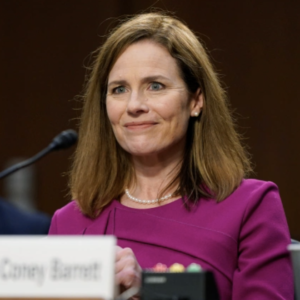It’s not a trial. But the hearings before the Senate Judiciary Committee into the nomination of Amy Coney Barrett to the Supreme Court seemed like one.
This juror’s verdict: Guilty as charged in one liberal indictment and a toss-up in the other. Judge Barrett seems destined to vote to overturn Roe v. Wade. But on the Affordable Care Act, which is of more immediate concern to more Americans, she may parse her judgment and endorse the doctrine of selectivity.
Two big things about Barrett: Her opposition to abortion is, one concludes, founded in her devout Catholicism and in her experience among lawyers of the right, led by Justice Antonin Scalia, for whom she clerked.
The other thing about Barrett is that she has seven children, two adopted from Haiti. She used this before the committee as a shield, a defense, and a statement, which said by implication: “See, I’m human, empathetic, caring and maternal.”
This is important. As Barrett, who almost certainly will be confirmed, matures on the court, her family may be a moderating force, softening her otherwise rigid conservative views. As her children grow and experience the vicissitudes of life, she is likely to trade some of her harsh doctrines for a more humane ambiguity.
Take former Vice President Dick Cheney and his wife, Lynne. Their conservatism, devotion to the right, was never in question. But when their daughter Mary came out as gay, their view of that part of the social-political landscape softened.
It has been declared throughout the struggle to confirm Barrett that somehow it is not meek to bring in her religion.
This juror avers: It is.
When the religion of a public servant affects political decisions, it has ceased to be a private matter.
We’ve come a long way from the days when President John F. Kennedy’s Catholicism was cited in his election. Anti-Catholicism was then alive and well in parts of the political spectrum. Kennedy remained a committed Catholic, but he didn’t bring it into his governance of the country. That was as it should be.
Going forward, as the United States gets more diverse and when we can contemplate a time when Hindus, Buddhists, Muslims and other believers will take their place in national life, it is more, not less, necessary to ensure that separation of church and state is adhered to in everything, especially the Supreme Court.
Ergo, it can be argued that Barrett should recuse herself from Roe v. Wade. How much stature she would gain if she did! But most unlikely.
If the Democrats romp home with the White House and both houses of Congress, they would be in a position to legislate at least a quick repair to the Affordable Care Act and to start the process of legalizing abortion by federal law, not constitutional interpretation. But it will continue to fuel the culture wars.
It is not certain how much the Democrats will gain in the election and, as a longtime observer of Washington, I don’t believe long term a Democratic sweep would be good. A bit of tension in Congress is a net benefit. So, the Barrett nomination and confirmation weighed heavy as we watched her parry the Democratic questioners.
Extenuating fact: The judge is much smarter, more personable, and more in charge of her facts than expected.
She charmed. She is a power to be reckoned with. Many observers expected to get a candidate who would simply channel Scalia, her old mentor, and that we could know her mind from his writing — the way we can predict the attitudes of Justice Clarence Thomas.
That, it became clear, is not to be the case.
The verdict of this juror then is: After a rocky start on two difficult issues, Barrett will grow to be a serious, thoughtful justice.
Possibly, with time, even a humane one.

